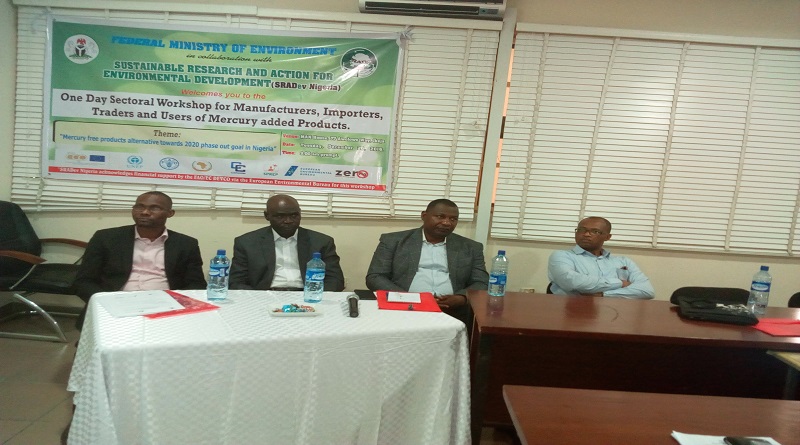Nigeria: FG,SRADev sensitize stakeholders on mercury-added products ban
http://www.ecogreennews.com/nigeria-fg-sradev-sensitize-stakeholders-on-...
Kayode Aboyeji

As the fast approaching year 2020 target set by the global community to ban the use of mercury-added products approaches, the Federal Government in collaboration with Sustainable Research and Action for Environmental Development (SRADev Nigeria) have sensitized importers, traders, marketers and users of mercury added products such as measuring medical devices, batteries, switches/relays and lamps among others on the phase-out of mercury-added products in Nigeria.
At a day-long sensitization workshop held on Tuesday December 20, 2016 at the Manufacturers Association of Nigeria (MAN) house, Ikeja, Lagos, representative of the Federal Ministry of Environment, Dr. Idris Goji, said in order to respond to the global decision through the Minamata Convention on Mercury, which contains global decisions concerning the future production, trade and use of mercury added products, the country needs information on the status of mercury added products and alternatives in Nigeria.
Goji explained that mercury and its compounds are very toxic and have adverse effects on human health and the environment, adding that exposure to mercury causes neurological development problems in unborn children, lower fertility, and behavioural disorders and health among others.
He disclosed that the Minamata Convention was adopted at a Diplomatic Conference in Kumamoto, Japan in October, 2013 to protect the human health and environment from anthropogenic emissions and releases of mercury and mercury compounds in which Nigeria is a signatory.
To achieve the objective, he said, the Convention requires parties not to allow the manufacture, import or export of mercury added products by 2020 including batteries-except for button zinc silver oxide and button zinc batteries with a mercury content less than two percent; switches and relays; cosmetics-with mercury above 1ppm, including skin lightening soaps and creams and Compact and Linear fluorescent lamps with mercury content exceeding 5mg per lamp.
Goji however, added that effective mercury free alternative products are now increasingly being introduced and available and, with the coming of the convention into effect, hopefully next year, with more countries banning mercury added products, the markets will respond and economies of scale will increase the market availability of mercury-free products in the market.
“He went further, “WHO-Health Without Harm has launched a global initiative to shift from global production of mercury thermometers and blood pressure cuffs to mercury free by 2017 and many developing countries are already taking steps to eliminate the purchase of mercury-added medical devices,” he added.
Executive Director, SRADev-Nigeria, Leslie Adogame, explained that the core objective of the phasing out mercury-added products in Nigeria is ”Developing strategies for phasing out mercury-added products and reducing mercury use in Artisanal and Small Scale Gold Mining through development of National Action Plans in four ACP countries in the African region, in conjunction with the preparation/implementation of the Minamata Convention on Mercury.
Adogame added that Nigeria is one of the four participating countries in the project with focus on phasing out Mercury-added products.
“Its specific objective is to strengthen the implementation of Multilateral Environmental Agreements (MEAs) in the chemicals, waste and biodiversity clusters at the national and regional levels in ACP countries. It is important to state at this juncture that, the outcome of the project is targeted at contributing to the Minamata Convention on Mercury.
“As you are all aware, there is a global concern on the adverse health and environmental effects of Mercury pollution. Since February 2009, world governments agreed to establish an Intergovernmental Negotiating Committee (INC) to prepare a global legally binding instrument on mercury called Mercury Treaty or Minamata Convention, which came to effect in October 2013 and to which Nigeria is now a signatory,” he said.
Representative of National Agency for Food and Drug Administration Control (NAFDAC) Mr. Anthony Hotton, explained that the organization captures Article 3 and 4 of the Minamata Convention. He added that the organization is empowered by law to regulate on export, import and advertisement of products.
Manufacturers Association of Nigeria (MAN) representative, Mr. Femi Gbadegun, said the organization will key into the phase out of mercury so that they will not be cut unawares.
According to him, the phase out process will in the short run may affect business but in the long run, it will be to the benefit of all.
He, however, advised the workshop organizers to consider another forum in early 2017 so as to have more participation as it will be good for any policy to be well debated so that people will not complain of not been carried along.
The workshop also served as an avenue for the government to get feedback on availability of mercury free products in the markets, their affordability, effectiveness and acceptance by the Nigerian consumers.
It also serves as an avenue to sensitise importers, traders and users of mercury added products to begin making plans to transit from the importation, trading and use of mercury added products to mercury free products in order to remain in business beyond 2020.
